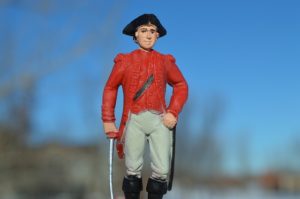In my last post, I shared the story of Mrs. Butterfield – who returned home to Menotomy, after fleeing the Redcoat march to Concord, to find that a wounded patriot and a wounded redcoat were both in a single bed in one of the rooms of her home.
“While receiving the best of care at the Butterfield home, he (the Redcoat) was visited by Rev. Dr. McClure, a prominent clergyman, who kept a journal, a fragment of which has come to light, and is of great interest, not only to the people of Menotomy, but to all interested in the events of that time.
FRAGMENT OF DIARY.
 . . . that it was flattened on one side by the ribs as if it had been beaten with a hammer. He was a plain, honest man, to appearance, who had voluntarily turned out with his musket at the alarm of danger, as did also some thousands besides, on that memorable day. [Doubtless Mr. Hemenway of Framingham.] In the same room lay mortally wounded a British officer, Lieutenant Hull, of a youthful, fair, and delicate countenance. He was of a respectable family of fortune in Scotland. Sitting on one feather-bed, he leaned on another, and was attempting to suck the juice of an orange which some neighbor had brought. The physician of the place had been to dress his wounds, and a woman was appointed to attend him.
. . . that it was flattened on one side by the ribs as if it had been beaten with a hammer. He was a plain, honest man, to appearance, who had voluntarily turned out with his musket at the alarm of danger, as did also some thousands besides, on that memorable day. [Doubtless Mr. Hemenway of Framingham.] In the same room lay mortally wounded a British officer, Lieutenant Hull, of a youthful, fair, and delicate countenance. He was of a respectable family of fortune in Scotland. Sitting on one feather-bed, he leaned on another, and was attempting to suck the juice of an orange which some neighbor had brought. The physician of the place had been to dress his wounds, and a woman was appointed to attend him.
"I observed that he had no shirt on, and was wrapt in a coating great-coat, with a fur cap on his head. I inquired of the woman why he was thus destitute of clothing. He answered, 'When I fell, our people [the British] stripped me of my coat, vest, and shirt, and your people of my shoes and buckles.' How inhuman! his own men! I asked him if he was dangerously wounded. He replied, 'Yes, mortally;" that he had received three balls in his body. His countenance expressed great bodily anguish. I conversed with him a short time on the prospect of death, and a preparation for the solemn scene; to which he appeared to pay serious attention. He lived about a week; and the people conveyed his body in a coffin to Charlestown ferry, where I happened to be present, and a barge from the Somerset took it to Boston.
"Not far from this house lay four fine British horses; the people were taking off their shoes. One informed me that a wagon loaded with provisions was sent from Boston for the refreshment of the retreating army, under an escort of six grenadiers. They had got as far as this place, when a number of men (ten or twelve) collected, and ordered them to surrender. They marched on, and our men fired, killed the driver and the horses; when the rest fled a little way and surrendered.
"Another wagon sent on the same business was also taken that day. It was strange that General Gage should send them through a country in which he had just kindled the flames of war, in so defenceless a condition. Saw three regulars in beds in a house in Cambridge; one of them mortally wounded. Conversed with them on their melancholy situation. One of them refused to answer, and cast upon me a revengeful look. Perhaps he was a Papist, and his priest had pardoned his sins. The houses on the road of the march of the British were all perforated with balls, and the windows broken. Horses, cattle, and swine lay dead around. Such were the dreadful trophies of war for about twenty miles.”
Taken from Beneath Old Roof Trees, 1896, by Abram English Brown

